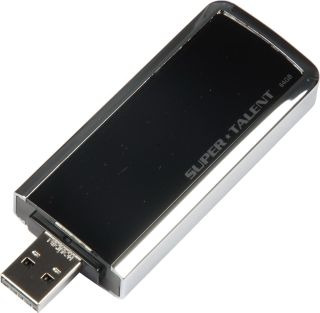Not All USB 3.0 Implementations Are Created Equal
Despite the fact that today's USB 3.0 products center on the same NEC controller, we compared a handful of different USB 3.0 drives and found performance to range from 113 to 173 MB/s, depending on the implementation used. Should you be worried?
The Test Device: Super Talent RAIDDrive 64 GB (USB 3.0)

We looked at Super Talent’s RAIDDrive a few weeks ago and found that it's still one of the fastest USB 3.0 devices available today. The key to its 177 MB/s performance is an internal RAID setup that can take advantage of the fast USB 3.0 interface. While this ensures top performance, it heats up the drive quite a bit, too.
| System Hardware | |
|---|---|
| Hardware | Details |
| CPU AMD I | AMD Phenom II X6 1090T (45 nm, 3.2 GHz, 6 x 512 KB L2 and 6 MB L3 Cache, TDP 125 W, Rev. C3) |
| Motherboard (Socket AMD3) | Asus Crosshair IV Formula (Rev. 1.0), Chipset: AMD 890FX, BIOS: 0701 (04/02/2010) |
| CPU Intel | Intel Core i5-750 (45 nm, 2.66 GHz, 2 x 256 KB L2 and 8 MB L3 Cache, TDP 95 W, Rev. B1) |
| Motherboard (Socket LGA1156) | Gigabyte P55A-UD7 (Rev. 1.0), Chipset: P55 Express, BIOS: F3 |
| RAM DDR3 | 2 x 2 GB DDR3-1333 (OCZ3G2000LV4GK 8-8-8-24) |
| HDD | Seagate Barracuda 7200.11 500 GB, ST3500320AS, 7200 RPM, SATA 3Gb/s, 32 MB Cache |
| USB 3.0 Device | Super Talent RAIDDrive 64 GB, USB 3.0 |
| Storage Controllers | USB 3.0: NEC D720200F1 |
| Graphics | Sapphire Radeon HD 5850, GPU: Cypress (725 MHz), Graphics RAM: 1024 MB GDDR5 (2000 MHz), Stream Processors: 1440 |
| Power Supply | PC Power & Cooling, Silencer 750EPS12V 750W |
| Benchmarks | |
| I/O Performance | Fileserver-BenchmarkDatabase-BenchmarkWebserver-BenchmarkWorkstation-BenchmarkStreaming Reads and Writes |
| System Software & Drivers | |
| Operating System | Windows 7 Ultimate |
Stay on the Cutting Edge
Join the experts who read Tom's Hardware for the inside track on enthusiast PC tech news — and have for over 25 years. We'll send breaking news and in-depth reviews of CPUs, GPUs, AI, maker hardware and more straight to your inbox.
Current page: The Test Device: Super Talent RAIDDrive 64 GB (USB 3.0)
Prev Page Western Digital MyBook 3.0 Kit With Controller (NEC PD720200) Next Page Benchmark Results: Bandwidth And Read/Write TestingMost Popular

